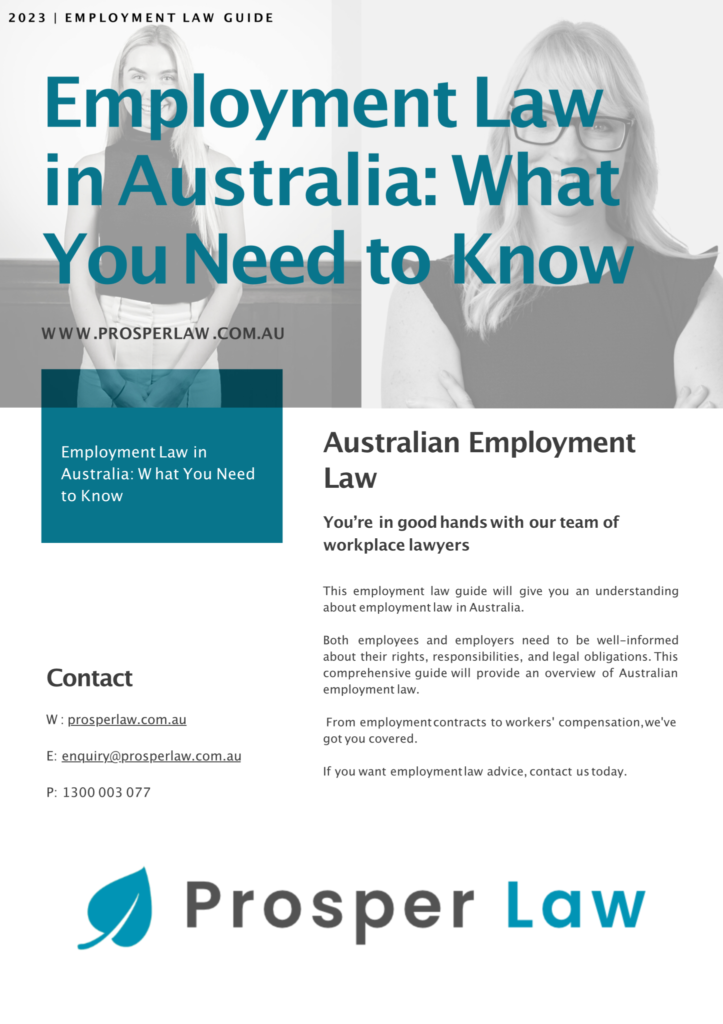As a CEO or senior HR executive, you’re likely focused on growth, profitability, and strategy. But one overlooked risk area is employment contracts.
Many businesses still operate without proper contracts for casual employees, contractors, or even permanent staff. The question is: Do you really need a contract for every team member?
The short answer: Yes. Every person working in your business (whether permanent, casual, or a contractor) should have a written contract. Failing to do so leaves your organisation exposed to legal, financial, and reputational risks.
This article, written by our workplace lawyers, outlines why businesses should implement employee contracts and provides clarity for senior workplace managers.
Key Takeaways
Written contracts protect your business against disputes and clarify obligations.
Casuals and contractors carry unique risks if not properly documented.
Courts may reclassify contractors as employees without clear agreements.
Contracts safeguard intellectual property, confidentiality, and compliance.
CEOs and executives are legally accountable for workplace compliance.

Why Employment Contracts Matter for All Staff
1. Protecting Your Business Interests
Without a written contract, you might need to rely on verbal agreements or assumptions with that employee.
This creates ambiguity around pay, responsibilities, confidentiality, and termination.
A contract ensures certainty and compliance with the Fair Work Act 2009 (Cth) (Fair Work Act) and other employment laws.
For a deeper understanding of employer obligations under the Fair Work Act, see our guide to the Fair Work Act for employers.
2. Casual Employees – Not “Casual” Risks
Casual staff are often hired for flexibility, but without a clear contract, your business may face claims for permanent entitlements such as annual leave or redundancy pay. A well-written casual employment contract helps manage these risks.
If you employ casual staff, it’s critical to understand leave entitlements for casual employees as well.
3. Independent Contractors – Hidden Employment Risks
Courts frequently reclassify contractors as employees if their contracts don’t reflect genuine independence. This can trigger back-pay liabilities, superannuation obligations, and tax penalties. Properly drafted independent contractor agreements can help provide a strong defence.
4. Safeguarding Confidentiality and Intellectual Property
From trade secrets to client databases, your company’s assets must be protected. Without a contract, employees and contractors may legally take sensitive information with them when they leave.
5. Avoiding Costly Disputes
Employment disputes are expensive and time-consuming. Well-drafted contracts reduce the likelihood of misunderstandings and litigation – saving money and executive time (a win-win in our view!).
To avoid costly mistakes, consider why employment contracts should be drafted by lawyers, not artificial intelligence.”
Risks of Not Having Employment Contracts
When businesses skip written agreements, they often underestimate the legal and financial consequences that they’re exposing themselves to.
Here are the most common risks faced by companies without proper contracts in place:
Misclassification of Workers: Casual staff may later claim that they were permanent, or contractors may be reclassified as employees, leading to back-pay claims.
Wage and Entitlement Disputes: Without written terms, disputes over pay rates, overtime, and leave entitlements are harder to defend.
Sham Contracting Penalties: Fines under the the Fair Work Act can be severe if contractors are deemed to be “sham” arrangements.
Loss of Confidential Information: Employees or contractors could leave with client lists or trade secrets, and without clear agreements, your legal options are quite limited.
Reputational Damage: Employment disputes can become public, damaging your brand and credibility with stakeholders.
Employer Takeaway: Don’t leave your business exposed, contact Prosper Law to draft or review your employee contracts.
Practical Insight: What If There’s No Contract?
If no written contract is in place, your business can’t set its own terms. Instead, your business must rely solely on the National Employment Standards (NES) and any applicable modern award by default.
While these set out minimum rights and conditions, they don’t cover everything an employer needs to protect their business.
This means:
Minimum conditions apply: hours, pay, and leave are set by law, not your business. So you have might have little to no scope to adapt beyond the minimum standards.
Flexibility is reduced: you can’t properly tailor terms for casuals, contractors, or senior staff without a written agreement.
Higher risk of disputes: employees may claim entitlements that exceed what you intended if nothing is documented.
Limited protection: key issues like confidentiality, intellectual property, and notice periods aren’t automatically covered by the NES or awards.
To understand how the NES interacts with employment contracts, read our guide on Employment Contracts and the National Employment Standards.

Real-Life Examples
Tech Startup: A casual developer sued for unpaid annual leave, arguing they were effectively permanent. With no written contract, the business had to settle at a six-figure cost.
Construction Industry: A contractor was reclassified as an employee after a dispute. The company was ordered to back-pay superannuation and overtime, plus penalties for sham contracting.
Professional Services: An employee without a confidentiality agreement left to join a competitor, taking key client data. The absence of a written contract made legal action difficult.
Don’t risk becoming the next case study – contact us for a free initial consultation today.
Frequently Asked Questions
Do I legally need contracts for every employee?
Yes. While not all arrangements must be in writing by law, employment contracts provide essential legal protection and reduce risk for businesses. This applies to all businesses, whether a small business or large organisation.
Are casual staff covered by the Fair Work Act without contracts?
Yes, but without a written contract, you risk misclassification and disputes over entitlements.
Can contractors use verbal agreements instead of contracts?
They can, but this leaves your business exposed to tax, superannuation, and liability risks. Written agreements are critical to set out the intended relationship.
How often should contracts be updated?
Whenever there are legislative changes, shifts in role responsibilities, or significant business restructures.
When business needs change, it’s important to know how to vary an employment contract under Australian law without creating new risks.
What should be included in every employment contract?
Key terms include role duties, remuneration, termination, confidentiality, intellectual property, and dispute resolution mechanisms.
Employment contracts are not just a formality – they are a vital safeguard. Every staff member, from casuals to contractors, should have a written agreement. As a senior leader, ensuring compliance not only protects your organisation but also strengthens culture, accountability, and long-term stability.




